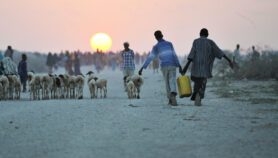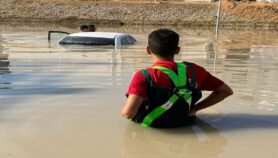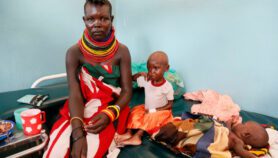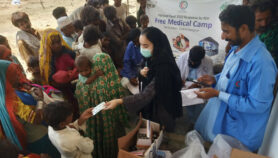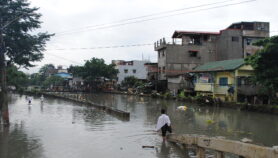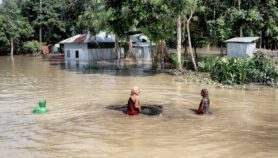Send to a friend
The details you provide on this page will not be used to send unsolicited email, and will not be sold to a 3rd party. See privacy policy.
Below is a round up of news from or about South Asia for the period 27 June–10 July.
Vitamin A ‘cuts newborn deaths’
A single oral dose of vitamin A given shortly after birth can help reduce deaths in newborns, a study shows. The study in over 15,900 babies in Bangladesh, most of who were born at home, shows that vitamin A given around seven hours after delivery cuts deaths by 15 per cent. The strategy could save 300,000 babies in Asia every year, the researchers say. More>>
Satellites aid Myanmar relief
Earth observation satellites provided vital information to relief workers in Myanmar following the devastating cyclone Nargis that struck the country in May. The satellites helped develop rapid maps to estimate the flood surge impact and other damage to help plan emergency response operations. More>>
Sri Lanka top South Asian country in environmental index
Sri Lanka has topped South Asian countries in the 2008 global environment performance index (EPI), coming fiftieth out of 149 countries. The 2008 EPI uses 25 indicators in its grading system, including environmental health, air pollution, water resources, biodiversity and habitat, productive natural resources, and climate change. More>>
Indian scientists pinpoint breast cancer gene variation
Indian scientists have zeroed in on a specific variation in the breast cancer-causing BRCA2 gene, which they say could be an important factor in developing the cancer. Their conclusion is based on extensive analysis of genetic variations in the gene. More>>
Poor follow-up ‘hampers Indian cancer care’
Lack of active follow-up of cancer patients in India, including survival rates, could hamper more accurate diagnosis and treatment attempts. A paper from the WHO cites a study in Chennai that shows biased estimates of cancer patients in the country. Survival estimates from population-based cancer registries are important indicators for evaluating cancer diagnosis and treatment, and the effectiveness of overall cancer services in a given region. More>>
Indian seeds safely installed in Arctic vault
India’s science minister Kapil Sibal has deposited seeds of five Indian plant varieties — two rice and three wheat — in the Svalbard Global Seed Vault at Longyearbyen. The seed vault is a secure seed-bank located on the Norwegian island of Spitsbergen in the remote Arctic Svalbard archipelago. More>>
India and Australia form research alliance
India’s Council of Scientific and Industrial Research has signed agreements with Australia’s Commonwealth Scientific and Industrial Organisation (CSIRO) to collaborate on areas including energy and environment, biotechnology, health research, materials science, and chemical process technology. More>> ![]() [20kB]
[20kB]
Bt bacteria a dye-buster too
Bacillus thurigenisis not only combats the cotton-munching bollworm, but can rid waters and soils of red-coloured industrial dyes. It also removes over 90 per cent of acidic dyes from industrial wastewaters, report scientists from India. More>>
Graphite-based nanocomposites for fuel cells
Scientists in India have prepared graphite-based nanocomposites that can be used to make electrically charged plates in fuel cells — devices that produce electricity from fuels. The technique makes the plates more flexible and resistant to shocks. More>>
Ancient Sanskrit manuscripts go digital
Centuries-old unstudied Sanskrit inscriptions on strips of palms leaves and faded manuscripts, are getting digitised under a project in the Panjab University in Lahore. Experts are heading to Germany to learn Sanskrit, a language that was born in the Indian subcontinent. More>>
Foreigners exacerbate threat to Afghan snow leopards
Foreigners engaged in rebuilding Afghanistan’s economy are fuelling the hunting of the country’s endangered snow leopards. There are now only 100–200 of the big cats left in a country that once had more than all of Africa. More>>
Tigers disappear from Nepal park
The WWF, formerly the World Wildlife Fund, has sounded an alert over vanishing tigers from the Shuklaphanta wildlife reserve in western Nepal. Few tigers now remain the reserve that once boasted of the highest density of tigers in the world. More>>





